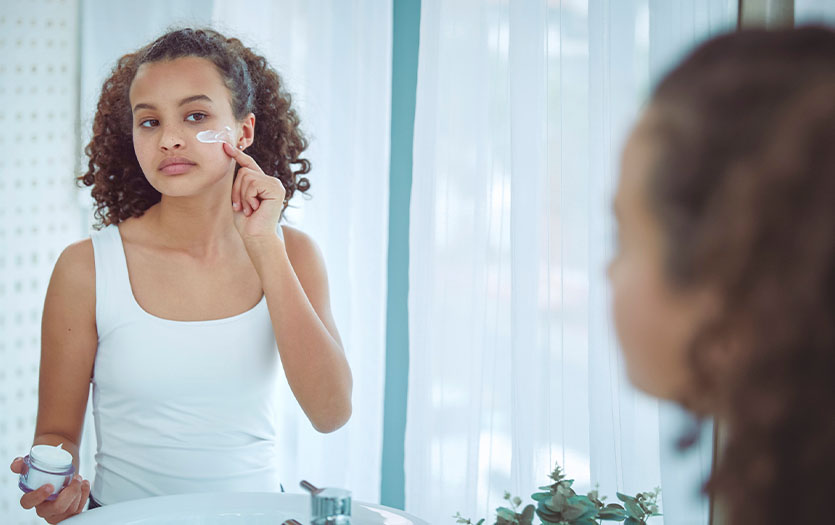
This post was written by Melissa Williams, MD, and Hallie Henry, LPN, PPG - Dermatology, Ohio.
Retinol is a form of vitamin A that has been highly regarded in the skincare industry for its numerous benefits. The ingredient is present in many over-the-counter beauty products and medications to treat common dermal conditions. Even though it is not a new treatment, retinol has been a popular topic of discussion recently among beauty gurus and social media influencers. As adolescents and teenagers experience changes in their bodies, such as breakouts, growth spurts or hormonal changes, the pressure to appear picture-perfect can be overwhelming. Fueled by trending topics on social media, young people have been seeking out age-defying products containing retinol. This is sparking additional debates among parents on the appropriateness of products containing retinol and the effects they may have on adolescent skin. While it is great to see our youth have a growing interest in caring for their bodies, we want to ensure they can explore this curiosity safely. In this blog post, we’ll take a closer look at retinol, its usage, its effects on skin and general skin care tips.
How retinol works
Retinol acts by stimulating skin cell production resulting in non-abrasive exfoliation, which reduces inflammation and prevents clogged pores. Additionally, it can decelerate the production of melanin and increase collagen production, which helps to reduce the appearance of hyperpigmentation as well as fine lines and wrinkles.
Also known as retinal and retinoids, it can be obtained in several strengths and forms. Topical treatments are meant to be applied directly onto the skin’s surface via creams, oils, gels, lotions, ointments and serums.
Of those available for purchase over the counter, retinol is the weakest, followed by retinal, then adapalene (Differin®). Retinols prescribed by a primary care physician or dermatologist, such as tretinoin (Retin-A®), trifarotene, tazarotene or adapalene are more powerful.
When to use retinol
Although widely touted for improving skin clarity and anti-aging properties, retinol can also be used for a variety of medical purposes. Under the supervision of a healthcare provider, it's used to treat skin conditions such as acne, psoriasis and hyperpigmentation (dark/sunspots).
There is no specific age requirement for when to start applying retinol. However, it is generally recommended that people in their 20s begin using it to address signs of aging proactively. Retinoids are likely unnecessary during the early teenage years to treat fine lines and wrinkles, however, starting earlier may be warranted for teens with oily or acne-prone skin.
When used for acne, it may take between six and eight weeks to see any noticeable improvement. Initially, blemishes can appear worse as the skin adjusts to the new practice.
How to apply retinol
The vitamin A derivative should be applied once daily at night. Here is a simple three-step method to add retinol into your routine:
Step 1: Begin by washing your face with a gentle cleanser and avoiding harsh scrubbing. Lightly pat or fan dry.
Step 2: Using only a pea-sized amount, apply a thin layer of retinol to your entire face. Be cautious to avoid the mouth, nose and eyes.
Step 3: Apply a moisturizer that won’t clog your pores.
Watch this video for additional skincare application tips.
Cautions
It’s crucial to keep in mind that retinol increases the skin's sensitivity to sunlight and susceptibility to sunburn, which can cause potential harm to the epidermis. Moreover, if the concentration is too strong for your skin type, it may also result in a rash or damage to the dermal barrier.
It is always important to apply sunscreen and protect yourself from direct sunlight by wearing protective clothing and hats, particularly while using retinol products. Using sunscreen to avoid cumulative sun damage is the single best anti-aging treatment.
Common temporary side effects of topical retinol treatment may include:
- Dry, irritated skin
- Itching or burning sensation
- Redness, peeling, flakiness, or scaling of the skin
- Sunburn
These side effects usually diminish as your skin adjusts to the treatment. If you experience a severe reaction, discontinue using the product and reach out to your healthcare provider. For individuals who have allergies or sensitive skin, consider consulting a dermatologist to explore products with alternative ingredients.
Final remarks
Retinol can be a very useful tool to have in one’s skincare repertoire to address acne concerns as well as its anti-aging benefits when used with other skin-protecting measures. For young teens just starting their skincare journey simplicity is key. A basic ritual that includes a gentle cleanser, non-pore-clogging moisturizer and a daily dose of SPF can help maintain the skin’s natural balance, without the risks that come with harsher products.
Is retinol right for you? Schedule a consultation with PPG – Dermatology or speak to your primary care provider to learn more.



